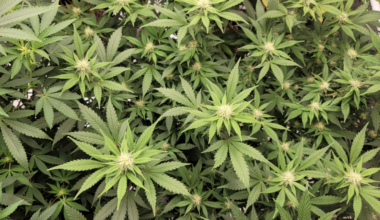“Nebraska’s signature distribution requirement gives disproportionate influence to voters in sparsely populated counties.”
By Cindy Gonzalez, Nebraska Examiner
Supporters of medical marijuana in Nebraska have launched a legal challenge to the state’s requirement that 5 percent of registered voters in at least 38 counties sign a petition to get the measure before voters on the ballot.
On Monday, Nebraskans for Medical Marijuana joined the American Civil Liberties Union of Nebraska in filing the federal civil rights lawsuit in U.S. District Court.
The organizations requested a decision by July 7 on the constitutionality of the multicounty signature distribution requirement. They also requested a court order to suspend the requirement by that date, which is the deadline for petitioners to submit their collected signatures.
‘Disproportionate influence’
Under current state law, people or entities that want to try to add, change or repeal laws can do so by collecting a certain number of supportive signatures. In this case, they must get 87,000 for each of two related petitions.
Petitioners must also meet a geographical requirement. Without 5 percent of registered voters in at least 38 counties represented (or two-fifths of the state’s 93 counties), the issue on the petition won’t make it on the ballot.
The lawsuit argues that the multicounty distribution requirement is an unconstitutional roadblock that violates the U.S. Constitution’s First Amendment guarantee of free speech and the 14th Amendment’s equal protection and due process clauses.
“Nebraska’s counties vary widely in population,” the lawsuit says. “As a result, Nebraska’s signature distribution requirement gives disproportionate influence to voters in sparsely populated counties.”
Petition backers say, for example, that a single voter in Arthur County has about as much power as 1,216 Douglas County voters when it comes to influencing whether their respective counties will meet the signature threshold.
That dilutes the votes of residents in urban areas, the groups said.
Son with epileptic seizures
Their lawsuit also raised a First Amendment claim that focuses on the extra burdens of cost and complexity that the requirement puts on campaigns.
“This unconstitutional roadblock makes it so prohibitive for Nebraskans without massive bank accounts to change our laws, even on incredibly popular issues like bringing access to medical cannabis to people who are suffering in Nebraska,” said Crista Eggers, a plaintiff in the lawsuit, which names Secretary of State Robert Evnen as the defendant.
This Nebraska Constitutional requirement has been in place for at least 100 years.
The Secretary of State’s office has been notified that a federal lawsuit was filed today by Crista Eggers and NMM (Nebraskans for Medical Marijuana) alleging that this multi-county signature
— NE Secretary of State Robert Evnen (@NEvnen) May 16, 2022
Eggers, the statewide campaign coordinator for Nebraskans for Medical Marijuana, has sought for years to qualify a ballot initiative and referendum de-penalizing the use and possession of medical cannabis. Motivating her, in part, is her 7-year-old son, who since age 2 has suffered from severe epileptic seizures.
Cindi Allen, Nebraska’s assistant secretary of state, responded to the lawsuit by saying the multicounty signature requirement has been in place for at least 100 years. Her office is responsible for enforcing the requirement.
“A medical marijuana initiative successfully met this signature requirement in 2020,” according to the statement from Allen. “That initiative was approved for the ballot by Secretary Evnen, but his decision was reversed by the Nebraska Supreme Court for other reasons.”
A medical marijuana initiative successfully met this signature requirement in 2020. That initiative was approved for the ballot by Secretary Evnen, but his decision was reversed by the Nebraska Supreme Court for other reasons.
— NE Secretary of State Robert Evnen (@NEvnen) May 16, 2022
She said the lawsuit has been turned over to the Nebraska Attorney General’s Office to defend and directed further questions to the attorney general.
Struck down in other states
State Sen. Adam Morfeld, co-chair of the medical marijuana campaign, said the legal challenge comes more than 50 years after the U.S. Supreme Court determined that a similar Illinois multicounty distribution requirement for ballot qualification violated residents’ rights.
He said courts have struck down such requirements in other states including Idaho, Utah and Wyoming.
A federal District Court judge ruled in 2014 that Nebraska’s requirement was unconstitutional, Morfeld said, but the 8th Circuit U.S. Court of Appeals later overturned the decision on a procedural matter without ruling on the merits of the case.
In every other state where a federal or state court has reviewed a similar requirement they have struck it down as unconstitutional – finding that it violated the Equal Protection Clause of the United States. Other geographic schemes have been found constitutional.
— State Senator Adam Morfeld (@Adam_Morfeld) May 16, 2022
The medical marijuana group said its predecessor, also called Nebraskans for Medical Marijuana, collected 196,000 signatures in 2020 from Nebraska voters in support of an initiative to legalize medical cannabis. The issue was disqualified from the ballot following a finding from the Nebraska Supreme Court of a violation of the so-called single subject rule, which requires a ballot issue to contain no more than one subject.
Reviving their efforts, organizers filed renewed paperwork to place two related referendum petitions on the November 2022 ballot. One petition would protect patients from arrest for possessing and using limited amounts of marijuana recommended by health care providers. The other petition would regulate a system for producing and distributing cannabis for medical purposes.
To date, supporters said, their campaign has collected more than 50,000 signatures. It needs 87,000 per petition by July 7 to qualify for the statewide ballot.
Democracy made ‘harder’
Petition supporters said their campaign, so far, has reached the 5 percent threshold in four of the required 38 counties.
Earlier this month, the medical marijuana group issued an “all hands on deck” plea to supporters to pitch in with the signature drive in the absence of $1 million that had been expected from a donor who died. That money was to help hire paid petition circulators.
Daniel Gutman, an attorney for the ACLU of Nebraska, said in a statement Monday that Nebraskans have the right to an “unencumbered petition process.”
“States can require that petitions must have support from certain geographic areas, but the Constitution is clear that it has to be done in a way in which everyone has equal say. The current system violates Nebraskans’ rights and hurts everyone by making it harder for Nebraskans to engage in direct democracy.”
This story was first published by Nebraska Examiner.
Medical Disclaimer:
The information provided in these blog posts is intended for general informational and educational purposes only. It is not a substitute for professional medical advice, diagnosis, or treatment. Always seek the advice of your physician or other qualified healthcare provider with any questions you may have regarding a medical condition. The use of any information provided in these blog posts is solely at your own risk. The authors and the website do not recommend or endorse any specific products, treatments, or procedures mentioned. Reliance on any information in these blog posts is solely at your own discretion.







